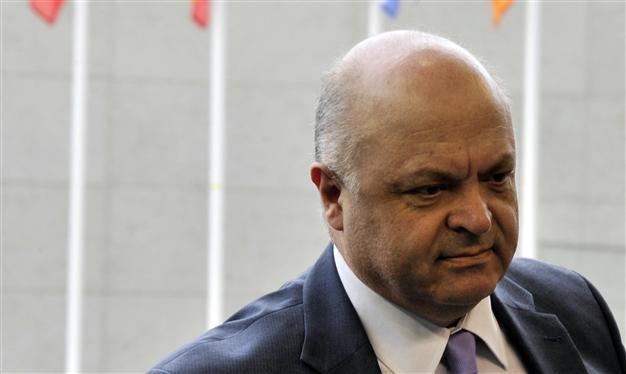Bad news for Greek Cyprus ahead of EU presidency
LONDON - Reuters

Greek Finance Minister Giorgos Zanias arrives for an Eurozone Council on June 21, 2012 at the Kirchberg conference center in Luxembourg. AFP Photo
Only days before taking over the term presidency of the European Union on July 1, Greek Cyprus’ leaders will discuss today options for reviving an economy on the verge of succumbing to a bailout, with a debate raging on whether the country should seek aid from the EU’s rescue fund or look further afield.Political leaders would meet today in the afternoon, a press release from the presidency said, shortly after ratings agency Fitch cut the island’s sovereign debt to non-investment grade.
Heavily exposed to the crisis in Greece, cash-starved Greek Cyprus needs to recapitalize its second-largest bank by June 29. For weeks, it has been trying to juggle its options between a bailout from Europe’s EFSF fund or a bilateral loan from either Russia or China.
It was unclear whether a loan from either country would be forthcoming, giving the Mediterranean island precious little leeway to rustle together 1.8 billion euros for Cyprus Popular Bank by the end of the week.
Fitch downgrades Cyprus
Government sources have told Reuters that President Demetris Christofias wanted to consult political leaders before taking a definitive decision, suggesting one was close.
Earlier yesterday Fitch downgraded Greek Cyprus to BB+, saying Cypriot banks could potentially need up to 4 billion euros in capital primarily on the back of losses in Greece.
Fitch said the amount, representing 23 percent of Greek Cypriot GDP, was mainly related to exposure in Greece, though a rapidly growing increase in non-performing loans at home was also a factor.
“Even assuming Greece remains in the eurozone, Greek Cypriot banks will have to bear significant loan losses as the Greek economy continues to contract over the medium-term as well as the deterioration in domestic asset quality,” Fitch said.
Fitch said it saw a heightened possibility of the Republic needing an EFSF bailout to recapitalize its banks, and a bilateral loan from the Russian federation to cover gross budgetary financing requirements until the end of 2013.
















